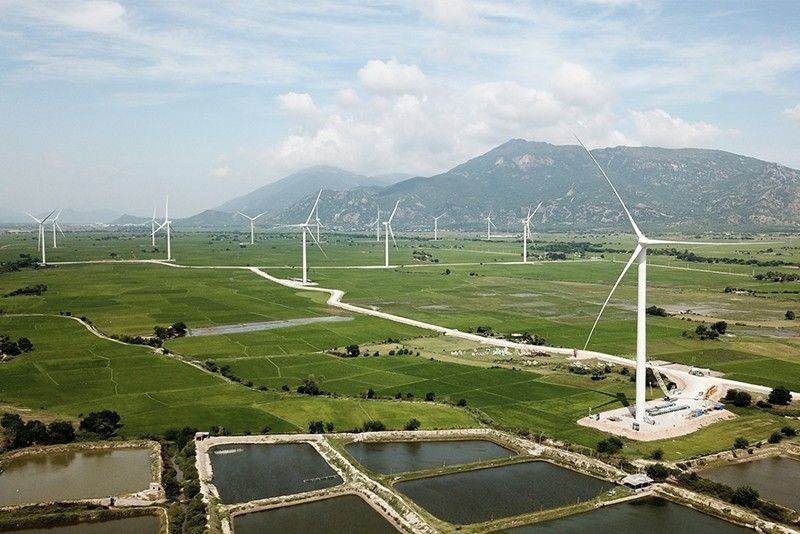Commentary: Will local actions matter in the global effort on climate change?

In the eighties, my usual conversation starter with foreigners was"“How is the weather?" As a Filipino, I would normally have the advantage of "all-year sunshine" as my counterparts in the Northern Hemisphere struggle with their four seasons.
Today, the weather and the underlying climate are serious topics that merit international attention and concerted action.
Back in 1988, the United Nations established the Intergovernmental Panel on Climate Change (IPCC), a group where the world’s leading scientists identify where there is an agreement in the scientific community on topics related to climate change, and where further research is needed.
The IPCC released last August 9 the first of its four-part Sixth Assessment Report and states, "It is unequivocal that human influence has warmed the atmosphere, ocean, and land. Widespread and rapid changes in the atmosphere, ocean, cryosphere, and biosphere have occurred."
The key point in this statement is that humans are responsible for these changes. The IPCC goes further: "Human-induced climate change is already affecting many weather and climate extremes in every region across the globe. Evidence of observed changes in extremes such as heatwaves, heavy precipitation, droughts, and tropical cyclones, and in particular their attribution to human influence, has strengthened since the Fifth Assessment Report."
In the Philippines, climate change manifests itself in the form of tropical cyclones that grow in intensity and scope over the years. However, what caught my attention was the higher-than-average sea level rise that local experts were predicting for the country.
As a resident of Las Piñas, I pass by the Zapote River Drive daily. I notice the dramatic changes in the river’s water level depending on the amount of rainfall. Surely the threat of faster sea-level rise strikes closer to home, placing my own family among the vulnerable groups to be affected by what the IPCC calls human-induced climate change.
Climate action has become an urgent personal affair.
It may be convenient to say that a small country like the Philippines cannot affect the trajectory of international climate actions, much less individual initiatives. But in this pandemic, when our enemy is too small to be visible, I have come to realize the power of targeted actions that start a domino effect.
Further, in the case of climate change, doing the right thing may be in our best interest as far as energy policy and economic development are concerned. Doing the right thing in practical terms means transitioning to renewable energy. Using current costs and local operating data, the National Renewable Energy Board has reported to the Department of Energy that renewable energy options are compatible with the least-cost power system development.
The Philippines used to lead Southeast Asia in renewable energy initiatives, having pioneered the electric power applications of geothermal energy in the 1980s, and solar and wind energy beginning 2000 or way before the Renewable Energy Act as signed into law on December 16, 2008. All those early renewable energy projects remain operational today.
Geothermal power plants are among the lowest-cost baseload power plants. Historically, geothermal has the highest capacity factors of local baseload power plants.
Even the early solar and wind power plants remain competitive in our power market, after all, they have practically zero marginal cost. Our recent data analytics on solar and wind show that their generation profiles are predictable, coincident with noontime and late afternoon peaks respectively, thus easy to dispatch.
All renewable energy power plants above share a common advantage — the lack of dependence on imported fuel that is subject to price volatility, currency fluctuations, and supply constraints.
Ironically, since the Renewable Energy Act, the Philippines' renewable energy share in power generation has fallen from 35% to less than 21%.
I am pleased to note that the DOE has been taking steps to stem this tide. Last year, DOE announced the moratorium on new coal power plants. Recent pronouncements have pointed to a significant increase in the Renewable Portfolio Standard mandate to distribution utilities. Early this month, the DOE issued guidelines on the Green Energy Auction that will call for about 2,000 MW of renewable energy capacity.
Aside from electricity production whose fuel input represents 51 percent of our total energy consumption, other sectors such as transport (21%) and manufacturing (12%) have similar cost-effective alternatives to the energy-intensive business-as-usual processes.
Expanding the coverage of our electric mass transport system will be cheaper, safer, more efficient, and convenient to local commuters. Likewise, the new bike lanes within highly urbanized cities signify the call of 87% of Filipinos who want cycling, pedestrians, and public transportation to be prioritized. Imagine the transformation of our cities into breathable and walkable spaces. These mechanisms are being implemented and I am hopeful that they will be expanded.
The energy efficiency and conservation law (Republic Act No. 11285) was signed on April 12, 2019. Hopefully, our commercial and industrial sectors will consider more efficient energy pathways that will lead to long-term benefits.
Even in my household, I have seen the benefits of efficient lights and appliances. The new induction and infrared stoves have made our LPG oven superfluous while making home cooking faster and cheaper.
However, even more benefits are possible with better design of living spaces with improved thermal insulation. All these measures can be done on a much larger scale by commercial and industrial companies. They stand to generate bigger savings and have productivity gains and we all benefit from their actions. Already we are seeing private initiatives along these lines spearheaded by the Philippine Energy Efficiency Alliance.
Stepping back, there appears to be a rising trend towards local climate actions lately. Government and private sector are both behind it, and that is what matters.
Alberto Dalusung III is the Energy Transition Advisor of the Institute for Climate and Sustainable Cities and former Director for Energy Planning of the DOE.
- Latest


























